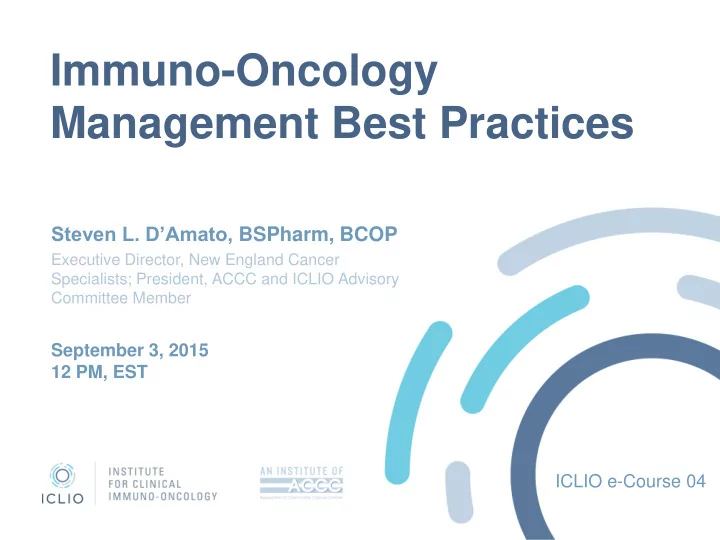

Immuno-Oncology Management Best Practices Steven L. D’Amato, BSPharm, BCOP Executive Director, New England Cancer Specialists; President, ACCC and ICLIO Advisory Committee Member September 3, 2015 12 PM, EST ICLIO e-Course 04
e-Course Overview • Administrative Challenges in Immuno-Oncology • Potential Best Practices • Implementing Best Practices and Preparing Your Practice for Success
ImmunoOncology: Key Administrative Challenges in Practice Managing onslaught of new information for staff 1 and patients, and ensuring that all are educated appropriately. 2 Managing reimbursement, patient financial support, and cash flow implications of new products. Updating practice protocols so that patients are 3 triaged appropriately, particularly with regards to new or unfamiliar adverse events. 3
[1] Managing onslaught of new information for staff and patients, and ensuring that all are educated appropriately. 4
Keeping up with new information • Current products on the market are the “tip of the iceberg” when looking at manufacturers’ I-O pipelines • During next one to five years, we can expect a new Immuno-Oncology product every few months • Not only new products, but a myriad of new combinations and regimens How can practices and their staffs keep up with the new information, stay informed, and make sure patients are appropriately educated? 5
Strategies for Information Management and Education Identify an “ Immuno- Oncology Champion” from among your physician staff to be the I- O “point person” for product questions. Does not have 1 to be the top I-O clinical expert, but needs to know where to get information. Also, task this person with helping to coordinate educational efforts for staff. Identify an existing or new group within your practice to manage 2 patient education, including the review of existing patient materials and/or the development of new materials specific to your practice. Find ways to regularly and proactively update your staff on new 3 information, avail your practice of manufacturer-provided resources including on-site training or education, and archive materials so new staff can be quickly on- boarded to your practice’s approach to I -O. 6
[2] Managing reimbursement, patient financial support, and cash flow implications of new products. 7
Reimbursement and Finances • Newest-to-market I-O injectables/infused products may not yet have specific J-Codes • High demand for off-label use of new products leads to additional reimbursement questions • Looking ahead: New combinations of I-O products with new or existing therapies will add to reimbursement complexity and financial overhead How can practices ensure financial stability and viability while quickly making new I-O therapies available to patients? How can practices best ensure that they are reimbursed, and that patients have the financial support that they need? 8
Strategies for Reimbursement and Financial Management Does your practice have enough Financial Counselors? Most 1 practices feel that Financial Counselors pay for themselves many times over; if you are not sure if you have enough, it’s a good time to conduct an analysis and consider hiring on this staff. Identify a point person from within your financial or reimbursement 2 staff to focus on IO and understand the nuances of various manufacturer programs, co-pay foundations, and patient assistance programs to optimize reimbursement and patient support. Develop an off-label policy for IO therapies. Suggested best practice: 3 • All off-label requests require predetermination • Patients are made aware of risks and benefits, including financial • Patients are required to sign 9
Challenges and Opportunities • Some private payers have been reported to be sending retrospective denials, particularly for off-label uses, even when there was a pre-determination in acceptance of the use . Ensure that you have pre-approvals or pre- determinations in writing when reimbursement may be in question. • While manufacturer co-pay programs may not be available for off-label uses, some manufacturer-sponsored programs may be able to assist with benefits investigations, appeals, and general reimbursement questions : Tap into these programs resources, and don’t be afraid to ask. • Patients may be willing to pay for I-O therapies out of pocket; Financial Counselors should be well-versed in having that conversation with patients in addition to talking about their benefits and/or patient support programs. 10
ACCC Resources: Financial Advocacy The Value of Dedicated Financial Coordinators http://www.accc-cancer.org/resources/pdf/FAN/FAN-The-Value-of-Dedicated-Financial- Coordinators.pdf ACCC 2015 Patient Assistance and Reimbursement Guide http://www.accc-cancer.org/publications/PatientAssistanceGuide.asp Patient Financial Advocate Position Description http://www.accc-cancer.org/resources/pdf/FAN/FAN-Patient-Financial-Advocate.pdf 11
[3] Updating practice protocols so that patients are triaged appropriately, particularly with regards to new or unfamiliar adverse events. 12
Updating Practice Protocols • I-O agents have a potential adverse event profile that differs from that associated with chemotherapy or commonly used biologic agents • Staff triaging patient phone calls to the practice need to be aware of potentially serious adverse events requiring immediate attention • Example: If patients go to ER or other setting, hospital clinicians may be unaware of adverse events associated with Immuno-Oncology therapies • Educating patients and staff and developing protocols for patient triage and management will help ensure that potential clinical events are quickly identified, managed, and mitigated. Have you updated your practice protocols, particularly with regards to triaging patients, to account for patients on I-O therapies and the potential associated adverse events? 13
Strategies for Updating Protocols Use your “I - O Champion” in the practice to take the lead in identifying any 1 practice protocols that may be impacted by the addition of I-O therapies in your practice. Ask all patients on an I-O therapy to clearly identify themselves as such; 2 make sure that these patients can be quickly identified as being on an I-O therapy in a chart or EHR tool. As part of staff education, ensure that clinical and non-clinical staff 3 understand and can identify the main potential adverse events associated with I-O products, and know when these events are potentially life- threatening and/or require immediate clinical attention. 14
Questions?
Register today! accc-iclio.org
Recommend
More recommend